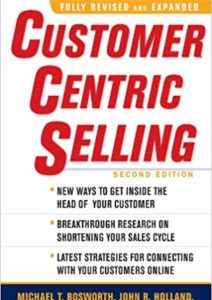One of the common complaints I’ve heard from Sales executives is that their people aren’t strong closers. To me this is a reinforcement of the fact that far too much emphasis is placed on closing. It’s as though a strong ending can salvage a poor 3-act play. Any seller that has seen Glengarry Glen Ross remembers Alec Baldwin’s advice on the ABC’s of selling: Always Be Closing. If only it was that easy. Frequent closes in B2B sales can be highly offensive to buyers who don’t appreciate pressure applied by sellers. This insinuates that the seller is in control and driving the buying process, rather than the buyer.
Many peoples’ impression about selling and closing is based upon experiences they’ve had in B2C transactions. Whether a retail store, buy insurance or buying a car, chances are the buyer and seller won’t ever do another transaction. The realization that if you leave they will likely lose the sale causes them to use high pressure closing tactics.
B2B salespeople often enjoy the benefit of multiple meetings/conversations. They reap what they sow during buying cycles. The better job they do in uncovering buyer needs and associated value, the more likely they’ll win the business.
Before earning the right to close, I believe buyers need to be aware of:
- The business outcomes they want to achieve
- The reasons they can’t achieve the desired results
- The capabilities needed
- Some type of proof (i.e. references or a demonstration)
- The price of the offering being considered
- The cost vs. benefit to understand potential value and payback
- How competitive offerings compare in terms of functionality and price
- Any implementation/conversion plans /costs if needed
Sellers are under constant time pressure each month, quarter and year to achieve quota. These pressures increase when pipelines are thin. My belief is that sellers issue premature quotes or proposals and close before buyers are ready to buy, therefore pressuring buyers and potentially putting opportunities in jeopardy.
There are several aspects of closing that sellers are either unaware of or disregard because they have their own agendas:
- Before closing buyers should understand their desired outcomes, why they can’t be achieved today, what capabilities are needed, the potential value and the price. In many instances they will want to compare at least 2 other vendors.
- It’s demeaning when sellers try to close non-decision makers. It’s awkward to ask for orders if they aren’t authorized to commit.
- Sellers make mistakes by not getting in front of decision makers to close. Some reply upon proposals they hope decision makers will not only read but also understand.
- Sellers pressure buyers when they close prematurely. Some buyers will be “put off” and may decide not to buy. Those that are willing to buy will almost certainly expect incentives (concessions and/or discounts) for buying sooner than they expected.
- There are few instances in B2B transactions when closing and discounting will work if sellers aren’t the vendor of choice. Some sellers rationalize that is makes sense to discount even if they can’t win because the winning vendors will accept lower prices. I believe putting low-ball numbers on the street can come back to haunt sellers.
- Unfortunately the old concept of selling is alive, if not well. The thought is a seller can convince, persuade and pressure buyers into giving them the business. This flies in the face of the reality that people prefer to buy without high-pressure tactics.
A seller earns the right to ask for the business if and when a buyer has all they need to make a buying decision. One of the most powerful motivators for buyers is a clear understanding of the potential benefit on a monthly basis so they understand delaying decisions means deferring benefit. If sellers do a good job, placing orders can be a logical conclusion for buyers. Some will volunteer to buy but if they don’t, the attempts to close will go much better.
Featured picture courtesy of New Line Cinema’s “Glengarry Glen Ross” (1992).










